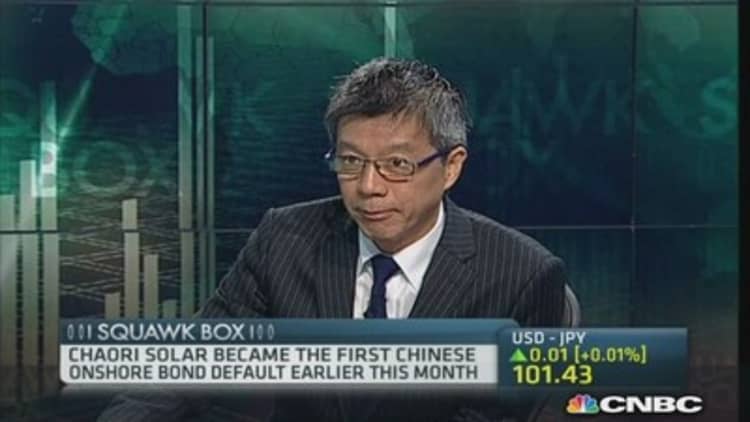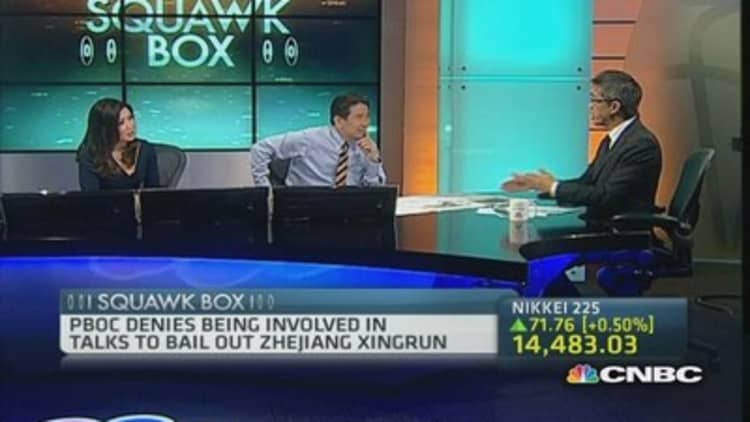
The drumbeat of bad news about debt defaults in China is likely to continue as the government appears unlikely to step in, but comparisons with Lehman Brothers or Bear Stearns may be overdone.
"It will cause a lot of volatility in credit markets and the equities market. People will lose money," said Lim Say Boon, chief investment officer at DBS Private Bank.
But he noted, "It's not going to be a Lehman moment. You can't get a Lehman moment in a closed economy, where the capital account is closed, where the banks are government owned, where the borrowers are largely government owned."
(Read more: Default risks trigger fresh fears over China property market)
China's debt problems have been a major concern for investors in recent years. The country's corporate debt hit a record $12 trillion at the end of last year, Standard & Poor's estimated, equivalent to 120 percent of gross domestic product.
The country saw its first bond default this month when Shanghai Chaori Solar Energy Science & Technology failed to make an 89 million yuan ($14.5 million) interest payment. Last year, Chaori avoided a bond default after a local government persuaded banks to defer claims for overdue loans and this allowed the firm to meet its bond interest payments.
Previously, government-led bailouts generally prevented investors and companies from feeling the sting of losses on poorly performing assets. Beijing appears to be signaling those days are past, but it isn't clear investors are getting the message.
Lim noted that as recently as a few weeks ago, Chinese investors told him they were expecting the government would not allow trust loans to default as it would undermine appetite for $600 billion-$900 billion of trust loans set to be rolled over this year.
(Read more: Cashin: Watching for China's 'Bear Stearns moment')
"The assumption was that they would come to the rescue in some way," he said, adding he disagreed. "The Chinese government (will) gradually increase the size of the haircuts imposed as a price for the bailouts and they will at some point start letting them fail and letting people take the losses, absorb the losses because they do not want this to get any larger than what it is," Lim said.
So far, the defaults have been confined to relatively small, privately-owned companies, but whether a state-owned company is allowed to go under will be closely watched.
"It sets the tone. It tells the market what the government's position is, how aggressive they are going to be in allowing the credit sector to sort itself out," Lim said. "If they allow state-owned enterprise bonds to go under, that's a signal it will be very aggressive."
(Read more: Is China's bond default the tip of the iceberg?)

Baoding Tianwei Baobian Electric raised concerns last week after its bonds were suspended from trade after the company, which is controlled by a state-owned enterprise, posted losses for two years. The company has pledged to make its July interest payment on the bonds and Bloomberg reported its controlling shareholder provided a guarantee for the notes in the 2011 prospectus.
Others think the involvement of state-owned enterprises could become a signal that the debt defaults may be turning more systemic.
"The more the government is involved, the larger the potential impact," Goldman Sachs said in a note. Local state-owned enterprises and local government financing vehicles, or LGFVs, often include implicit guarantees in their financing and removing the guarantee suddenly could impose systemic risk, the bank said.
But overall, Goldman doesn't expect a systemic risk to develop.
(Read more: Rare bond default warning in China a good thing?)
"Some defaults in trusts/LGFV bonds could be used to educate investors and mitigate moral hazard, which could help contain larger risk in the longer term," it said. "Although we do not rule out some small defaults occurring later this year, we think potential contagion risk would still be under control."
It expects the government will be proactive in containing credit risks this year by pushing through structural reforms, including shadow-banking regulation. "The chance of government bailout (directly or indirectly) is high for those projects with systemic risks," it said.
—By CNBC.Com's Leslie Shaffer; Follow her on Twitter @LeslieShaffer1

